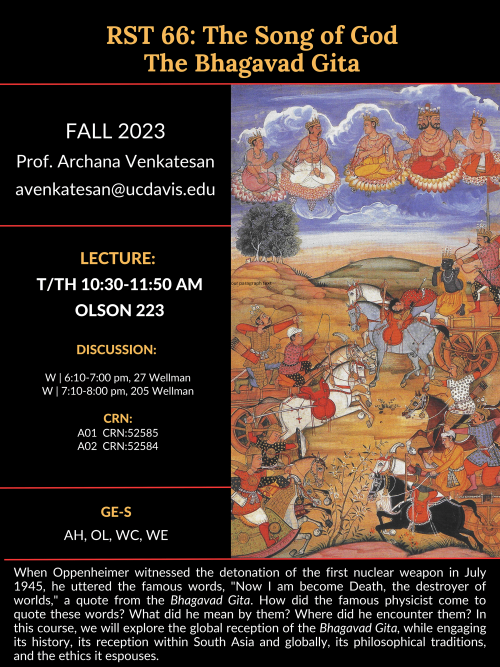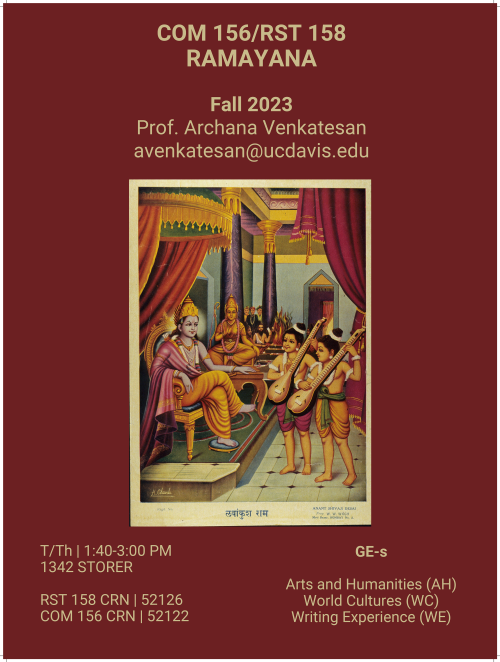Fall 2023 Courses
- For day, time, room, and TA information, see our PDF SCHEDULE or the class search tool https://registrar-apps.ucdavis.edu/courses/search/index.cfm.
- For all courses not described here, please refer to the General Catalog course descriptions: https://catalog.ucdavis.edu/courses-subject-code/rst/
RST 001B Death & The Afterlife
Seth Sanders
RST 023: Intro to Judaism
Eva Mroczek
This course surveys the history, practices, beliefs, texts, and traditions of Judaism both as a global phenomenon and as a part of American culture. Students will examine how various Jewish communities across history and the world have shaped their practices and beliefs within their own specific socio-historical circumstances, and how they have understood their identity as Jews alongside their other racial, ethnic, and cultural identities. Students will critically examine a range of primary sources, and discuss topics like observance of holidays, dietary laws, diverse ideals regarding family life and sexual behavior, and relationships with other religious and cultural groups. Students will explore how Jewish identity, textual traditions, religious practices, race and ethnicity, and political circumstances combine to define “Judaism” differently in diverse times and places. The course will also give students an opportunity to discuss and complicate a foundational question of Religious Studies -- what is a "religion"? -- through the study of Judaism and Jewishness, which has been defined in various contexts not only through the category of religion, but also in terms of race, ethnicity, nationhood, peoplehood, tradition, and culture.
RST 031: Intro to Jainism
Lynna Dhanani
RST 032: History of Yoga
Lynna Dhanani
RST 034: Introduction to Buddhism
Layne Little
RST 040: New Testament
Wendy Terry
RST 66: The Song of God | Bhagavad Gita
Archana Venkatesan
When Oppenheimer witnessed the detonation test of the first nuclear weapon in July 1945, he uttered these famous words: "Now I am become Death, the destroyer of Worlds," a quote from the Bhagavad Gita. How did the famous physicist come to know these words? How did he encounter the Gita? Is the quote accurate? In this course, we will explore the Bhagavad Gita as a global text, exploring its reception within and beyond the Indian subcontinent. We will engage with its history, the social milieu in which it was composed, its reception and the many philosophical strands that it weaves together.
GE-s: AH, OL, WC, WE
Required Texts
Laurie Patton. Trans. The Bhagavad Gita. Penguin Classics, 2008.
- ISBN-10: 0140447903
- ISBN-13: 978-0140447903
Richard Davis. The Bhagavad Gita: A Biography. Princeton, NJ: Princeton University Press, 2014.
- ISBN-10: 0691139962
- ISBN-13: 978-0691139968

RST 103: Medieval & Byzantine Christianity
Wendy Terry
RST 120: Religion, Magic, & Science
TBD
RST 130: Islamic law (Sharia), Gender, and Religious Authority
Mairaj Syed
RST 154: The Hindu Temple
TBD
Arshia Sattar. Valmiki Ramayana (Rowan Littefield)
Robert Goldman and Sally Goldman. The Ramayana of Valmiki: The Complete English Translation (Princeton Library of Asian Translation), Princeton, NJ: Princeton University Press, 2022.

RST 190: Seminar
Eva Mroczek
